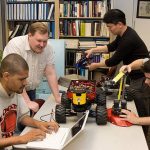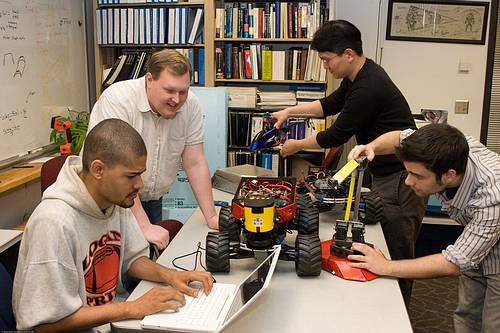 Ames, Iowa—Think about Mars, and visions of hot, dusty, and rough terrain come to mind. Designing a vehicle that can traverse that terrain and perform complex tasks is a challenge usually reserved for elite teams of professional engineers, but an enterprising group of Iowa State engineering students has created just such a vehicle.
Ames, Iowa—Think about Mars, and visions of hot, dusty, and rough terrain come to mind. Designing a vehicle that can traverse that terrain and perform complex tasks is a challenge usually reserved for elite teams of professional engineers, but an enterprising group of Iowa State engineering students has created just such a vehicle.
Iowa State’s team MAVERIC (Mars analog vehicle for robotic inspection and construction) will put its vehicle up against vehicles from seven other college teams at the 2008 Mars Society University Rover Challenge (URC). The competition will take place June 5-7 at the Mars Desert Research Station near Hanksville, Utah.
The teams will put their robotic creations through a series of four tasks featuring capabilities that could be needed for future missions to Mars. The rovers must travel across the simulated Martian terrain to specified sites. They will then collect geologic samples for analysis, conduct soil characterization tests, deliver an emergency supply container to a simulated distressed astronaut, and tighten bolts on a mock-up equipment panel.
Andreas Frick, MAVERIC’s project manager and a senior with a double major in aerospace engineering and political science, first learned about the Mars Society while writing a paper on space exploration policy. The Mars Society coordinates the URC, which is sponsored by Raytheon, to publicize its efforts as a private international organization dedicated to furthering the case for human exploration of Mars.
When the call for URC entries was announced, Frick sought support from Soon-Jo Chung, an aerospace engineering assistant professor and director of the Aerospace Robotics Laboratory, and Matt Nelson, chief design and operations engineer in the Spacecraft Systems and Controls Laboratory (SSCL). Sponsored through NASA’s Iowa Space Grant Consortium, SSCL provides students and faculty facilities and tools for conducting space-related research. Chung and Nelson agreed to help support the project, and team MAVERIC was formed.
In addition to Frick, the MAVERIC team members and their roles are Kito Berg-Taylor, lead vehicle engineer, control systems; Shuang Gao, vehicle and structural engineer; Keegan Gartner, robotics engineer; Daniel Harper, communications engineer; Mark Kane, vehicle engineer; Branden Rademacher, controls and GPS engineer; and Jerry Stoner, science specialist, electrical engineer. Chung and Nelson are advisors.
While starting a new project presented some challenges, Frick said the students have worked very well together to design and build a robust rover that can handle both the terrain and the tasks.
The students were able to take two rovers that Chung had purchased for his autonomous vehicle research and put them together. “They are basically remote-control trucks that were large enough we could take off the existing bodies, put on our own chassis, and add our custom electronics,” Nelson said.
A key for a successful Mars mission is to incorporate safeguards so that if one system fails another can take over. Iowa State’s team has done just that.
“Our rover has a laser range finder that provides feedback on obstacles and is able to remotely give the best pathway to the site,” Frick explained. “In addition we have cameras to provide navigation data, so even if we lose the radio link we can still accomplish the task.”
The tasks also require special equipment such as a robotic arm to tighten the bolts and a probe to measure such things as soil moisture. Decagon Devices, the company that designed the soil probe and environmental sensors that are on NASA’s Phoenix spacecraft, which landed on Mars on May 25, donated a probe to the team and is also serving as a sponsor.
Overall, the project has been a great experience for the students. “They’ve learned a lot about project management and systems engineering,” said Nelson. “Everything has to work together.”
Six students and Nelson will travel to Utah for the competition. Frick, who is currently on an internship with the Mars Society in Munich, Germany, will link up with his team via videoconference.
